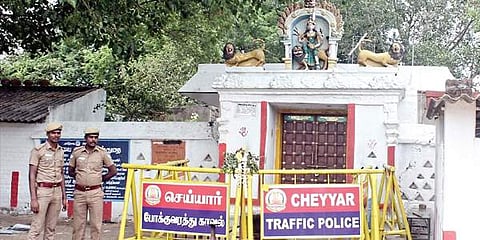

TIRUVANNAMALAI: An uneasy calm has enveloped Namandi and Hariharapakkam villages under Venpakkam Taluk in Tiruvannamalai district, Tamil Nadu. Ever since the Thulukanathamman Temple in Hariharapakkam was thrown open for the Dalits, a cold war has been brewing, with the caste Hindus allegedly discriminating against the former to express their displeasure.
On one hand is the caste Hindu community, reluctant to dilute its age-old custom by allowing non-members entry into Thulukanathamman Temple in Hariharapakkam, while on the other are the Dalits, wanting to cast away the shackles of superstitions.
The sparks flying out due to the friction between a penchant for dogmas and an ardent desire for change has transformed these two villages, where the caste Hindus and the Dalits, till a few days ago, led a relatively peaceful co-existence into a tinderbox, with the policemen keeping a watchful eye to keep the simmering tension from spilling onto the streets.
Located seven kilometres away from Venpakkam-Kancheepuram Main Road, Namandi is home to about 160 Dalit families. “There are about 1,800 caste Hindus living in the two villages. The surrounding villages too have predominantly a caste Hindu presence. We Dalits are around 500 in number. These days, every Dalit member walks on the streets in fear,” says a 55-year-old Dalit resident in Namandi Colony.
The issue started snowballing on July 22 last when a group of Dalit youth from Namandi petitioned Cheyyar Sub-Collector R Prabu Shankar, sought the right to participation in the Thulukanathamman Temple festival, conducted in the third week of Aadi (August). When the officials organised a peace meeting with the caste Hindus of Hariharapakkam, the latter refused to allow Dalits into the temple. The caste Hindus claimed that the century-old temple belonged to members of their community.
When after a series of peace talks the parties failed to arrive at a consensus, the officials unilaterally decided to open the temple for the Dalits. On October 25 last, the Cheyyar Sub-Collector opened up the temple for Dalits. Around 200 Dalits entered and offered prayers in the temple.
However, when the caste Hindus took to the streets opposing the official action, tension gripped the villages, forcing Tiruvannamalai Collector Prashant M Wadnere to issue an order to close the temple doors the very next day. Ever since the October 25 incident, the peaceful relationship the two communities shared was strained.
“Four share autos ply in the village, ferrying people to the main road. However, ever since our entry, we are not allowed into three autos operated by caste Hindus,” claims a college student.
Another Dalit recalls the friendly relations the community shared. “Some of us own agricultural land and cultivate paddy. Caste Hindus work as daily wage labourer on our lands, attending to all chores and even sharing our food and water. However, they steadfastly opposed our entry to the temple,” he adds.
Stating that the Dalits entering their temple was a breach of faith, a cross-section of caste Hindus said that the deity of Thulukanthamman was their Kula Theivam (guardian of their community).